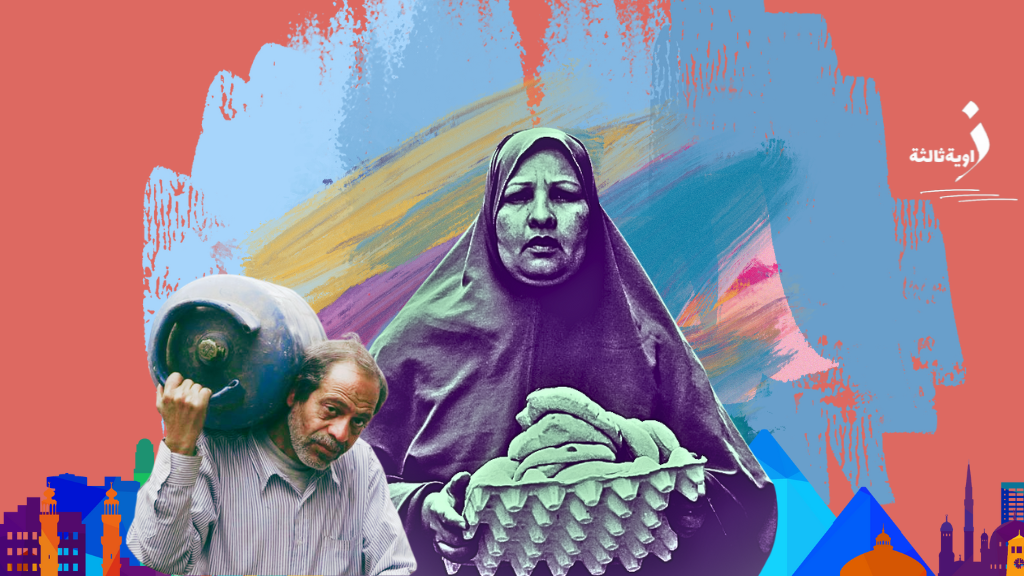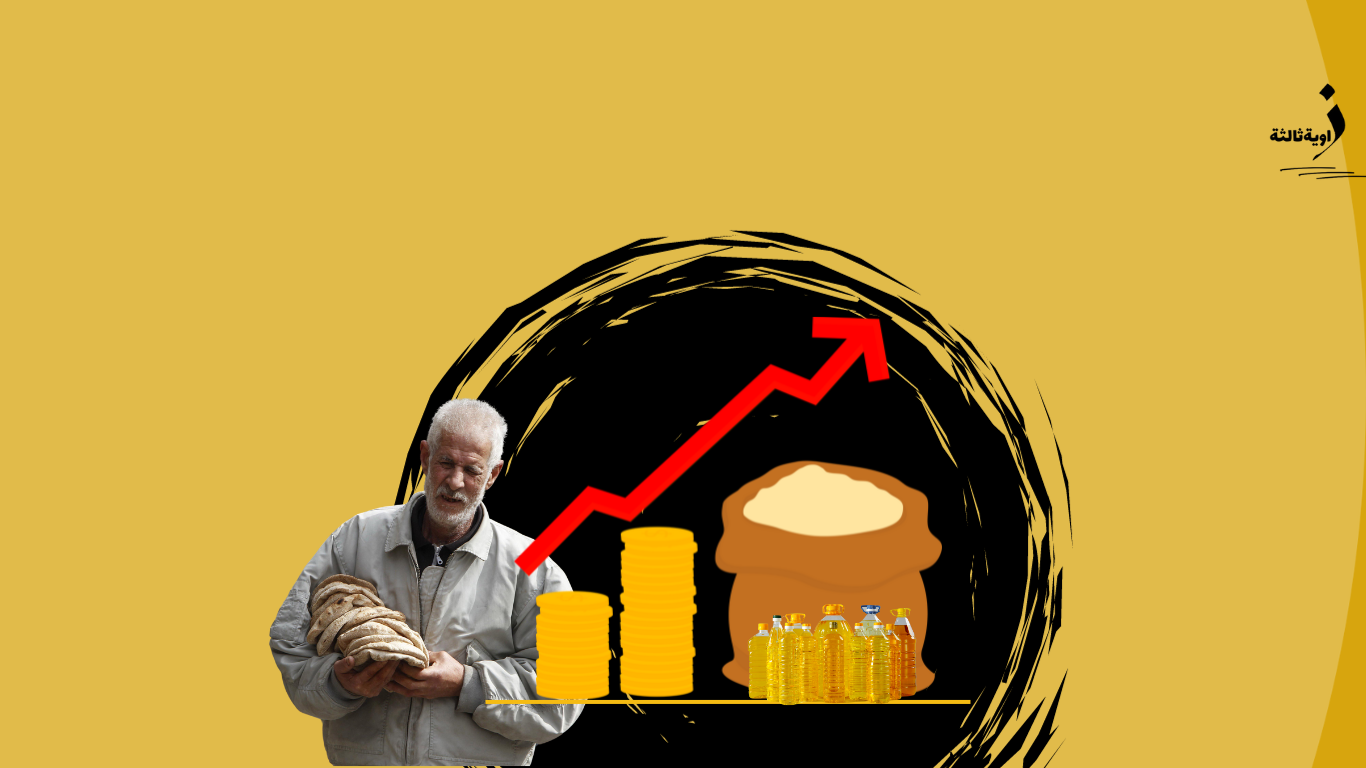Inflation is a global phenomenon, that’s true, but I don’t think its rates are rising at this pace anywhere else on earth as they are in Egypt. Hanan Mahfouz, a “homemaker,” says so.
She adds, “We inquire about the price of a commodity we bought yesterday, only to find it has risen today, prompting us to give up on many goods in an attempt to cut expenses. However, this pressure is in vain, as new pressure comes after the previous one, and every time we prioritize spending, we rush to adjust it due to price changes.”
An independent study conducted by the consultant of the Central Agency for Public Mobilization and Statistics, Heba Al-Laithy, projected that the poverty rate in 2022/2023 would rise to 35.7%, forcing the state to take this staggering number into consideration during the economic crisis that the country and the world are going through, described by the Egyptian government as unprecedented.
In a quick comparison of basic goods prices two years ago and now, we find that prices have doubled. The solution for Egyptians was to navigate living conditions as Hanan and her family did, starting by reducing expenses through buying smaller quantities of food. This is amid the government’s retreat from regulating markets and price movements, relying on launching initiatives and supplying discounted food through various official outlets or trade fairs organized in Cairo and other governorates.
Hanan says, “The high cost doesn’t only apply to food and drinks; government services are also skyrocketing. Transportation, electricity, gas, internet, gasoline, healthcare, and education, not to mention private lessons, which are a necessary evil.”
She adds, “Expense pressure started in 2018 by reducing quantities, then giving up on some goods and replacing them with others. For example, families no longer buy expensive fruits like apples and mangoes; they settle for oranges, figs, and grapes, which were considered affordable fruits, but even their prices have become astronomical. A kilogram of grapes reached 30 pounds, figs around 25, and oranges around 15 pounds.”
She wonders, “What else can we give up on? Local milk has exceeded 30 pounds. If you have a child and want to prepare a breakfast for him, it could cost you 30 pounds—just a cup of milk, two eggs, a slice of cheese, and two loaves of bread, no more and no less.”
She concludes, “I’m not talking about chocolate, juices, or nuts. I’m talking about the basics necessary for children’s nutrition. We gave up on many goods, and we still give up, trying to contain the high cost, but it surrounds us, pressures us, and squeezes us as well.”

Official Statistics
According to data from the Central Agency for Statistics, some prices have increased by more than 100% since 2018. For example, the average price per kilogram of white poultry was 30 pounds and has now reached 80. Local meat increased from 150 to 325, while the price of tilapia fish rose from 30 to 80 pounds.
The Egyptian government decided last year to expand the umbrella of the social protection program, increase the number of families benefiting from the “Solidarity and Dignity” program, and add a million new families to the program, benefiting more than 20 million citizens from the pension allocated to the program, ranging between 300 and 450 pounds per family.
The number of beneficiaries of the cash support program during the current fiscal year 2023/2022 reached about 4.1 million families, totaling 17 million citizens, with a budget allocated to it of about 22.5 billion pounds annually.
The Ministry of Supply announced its program to increase support for needy families with amounts ranging from 100 to 200 and 300 pounds, depending on the number of families on the support card, to provide social protection for them (the dollar is equivalent to 30 pounds in the official market and exceeds 50 pounds in the parallel market).
Food Substitution
Magda Khaled, a “homemaker,” says that families have reduced animal protein quantities to the minimum. However, is it reasonable for the price of a kilogram of potatoes to reach 25 pounds, a bottle of oil to be 65 pounds, local rice 30 pounds, and a loaf of bread outside the ration card to be two pounds, while it used to be “for two meals”? What are people eating? Are they eating each other?
She adds, “Let’s assume that a family decides to cook a simple meal, approximately 1.5 kilograms of potatoes for about 35 pounds, 1 kilogram of rice for 30 pounds, tomatoes for 10 pounds, and oil, ghee, spices, and onions for 20 pounds, knowing that this is a low estimate. In that case, the cost for the meal, the ‘Qordihi,’ will be 95 pounds. In other words, the cost of a meal for a family of 5 people per month is 3000 pounds, excluding proteins altogether, welcoming malnutrition, obesity, child growth problems, family disputes, divorce, and all the disasters that poverty produces.”
This is in addition to other expenses of no less importance, such as transportation, water, electricity, and gas, which must be paid or face the threat of service cutoff or significant fines in case of delay.
She adds, “Everyone has been affected by the insane rise in prices, from the rich to the poor; everyone has been affected one way or another and has devised solutions to confront this unrelenting increase, at least to catch their breath.”
Two or three years ago, I used to buy vegetables for about 50 pounds, which was enough to buy everything we needed for about two days, for example. Now, this amount barely covers the cost of salad ingredients or two types of vegetables in small quantities. In March of this year, the Egyptian Initiative for Personal Rights
published a study on the increase in poverty rates and food scarcity. It pointed out that poor families are replacing meat, grains, and bread with potatoes and pasta to obtain nutrients at a lower cost.
It revealed that low-income individuals living in extreme poverty in 2019, with an income of less than 550 pounds, faced harsh conditions due to the increase in food and beverage prices, as well as housing, clothing, education, health services, transportation, and healthcare, with poverty concentrated in rural areas, especially the northern region, where 43% of the poor live nationwide.
Shaban Mohamed, a vegetable seller in Helwan, confirms that customers now buy their needs in smaller quantities: “It has become normal for a customer to ask for half or a quarter kilogram of tomatoes, which is unprecedented for me after more than 20 years in the market. May God help the people.”
The low sales volume negatively affects my business, he adds. “In the past, I used to have four workers. Currently, I have only one seller assisting me. This is how people’s livelihoods are cut off. But there is no solution; I cannot afford to pay daily wages to workers while vegetable prices rise in wholesale markets. Goods may stagnate and deteriorate due to the decline in sales movement. Customers haven’t changed; they hesitate to come to the store, but the volume of their orders has decreased to extreme levels.”
Mahmoud Al-Asqalani, the head of the Citizens Against Inflation Association, told us about the survey conducted by the association on consumers and garbage collectors. He said, “Families have recently started, due to life pressures and rising prices, especially on food items, to innovate solutions to reduce spending and cope with price increases.”
He continues, “There is now consumption rationalization, and there is no more wastefulness as before, where some used to throw food remnants in the garbage. But that was in the past.”
The survey showed that families no longer throw away any food items; they resort to what can be called recycling. For example, if tomatoes are about to spoil, they become sauce, and so on. Garbage collectors in the same survey say that garbage is now devoid of food residues, to the point that cats and dogs no longer find anything to eat.
Mahmoud points out that Egyptian households are managed by women who are characterized by shrewdness, intelligence, and the ability to adapt to any circumstances. He says, “The Egyptian woman deserves the title of the world’s economy minister in the current circumstances because she manages the house with extreme skill in extremely bad conditions. But life goes on, with lessons, transportation, food, and so on.”
Similarly, with clothes, there are alternatives and attempts to coordinate children’s clothes with each other, exchanging and recycling them, or resorting to buying used ones. In addition, in terms of food and drink, households can do without consuming protein daily, but it has become once or twice a week.
There are also middle-class citizens who, after having two cars, are content with one that they share, and some rely on public transportation or carpooling. Many innovations by Egyptian citizens to overcome the rise in prices, especially in the past months, as 2023 witnessed the highest increase in prices not only in Egypt but globally.
The Role of Regulatory Authorities
Authorities claim to exert significant efforts in oversight; however, on the other hand, the crisis of the kilogram price of sugar exceeding 50 pounds continues. This increase has not subsided despite a global decrease in prices, according to the “Citizens Against Inflation” association. The association called on the government to compel traders to write the price on the product, pointing out that in the past year, there has been a change in the human and ethical composition of the Egyptian market, with traders now creating crises and weak regulatory oversight.
It is worth noting that the World Bank announced that Egypt tops the list of the top 10 countries most affected by global food price inflation, with a percentage of 36%. This announcement came after Egyptian companies operating in the food industries began raising the prices of their products by percentages ranging from 7.5% to 22.5%, raising Egypt’s inflation rate to record levels.
Food and beverage prices are exerting pressure on inflation rates, accounting for 71.7%, due to changes in vegetable prices by 101.5%, sugar and sugary foods by 41.9%, grains and bread by 44.6%, meats and poultry by 97%, dairy products, cheese, and eggs by 67.1%, and fish by 80.9%.
Juhayna, one of the major Egyptian food industry companies, implemented a new increase in dairy product prices ranging from 7% to 22.5%, coinciding with the rise in operating costs due to currency mismanagement. Additionally, Egyptian company Domty increased its product prices by up to 7.5%, according to a notice distributed to traders.
Egypt is grappling with a severe economic crisis characterized by a severe shortage of hard currency, a plummeting pound, and consequently, a sharp rise in inflation to significant levels.











